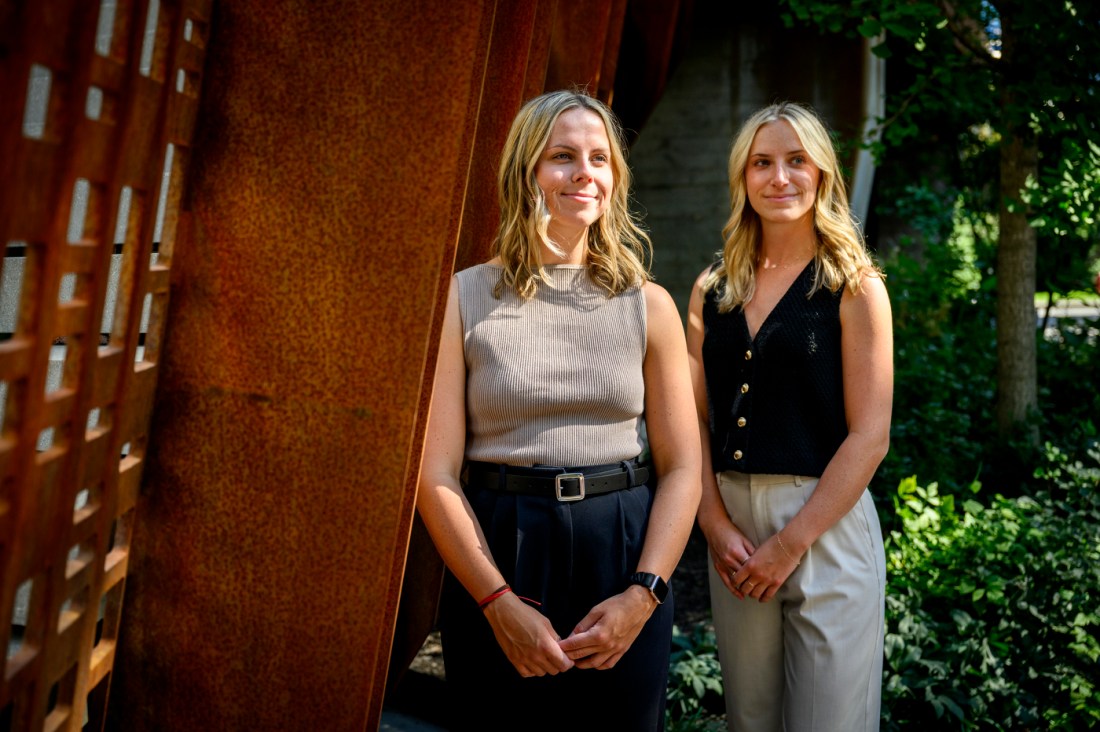Can twins make independent decisions while following identical career paths? Northeastern research explores ‘individuality’
“Twins very much want to connect with one another,” Northeastern’s Laurie Kramer says. “They want to preserve that closeness in their relationship, but they also need to find ways to chart their own identities.”

Cassandra Dean and Alexis Dean are fourth-year students with much in common.
They are fraternal twins who enrolled at Northeastern University together.
They are both majoring in health sciences as honors students. At Northeastern they joined the same research team. They were hired for the same emergency department co-op at Mass General Hospital. They went on the same Dialogue of Civilizations last summer. And they’re now applying to many of the same physician assistant programs.
“Alexis and Cassandra believe they made independent decisions about where to go to college, their majors and career plans,” says Laurie Kramer, a Northeastern professor of applied psychology. “Yet they’ve made the same exact choices about their futures on multiple occasions.”
The Dean twins, who had been assigned work study jobs at Northeastern’s John Martinson Honors Program, were hungry for perspective on their relationship. How had so many independent choices yielded so many identical results?
They conveniently were able to seek advice and support from Kramer because she was directing the University Honors Program.
“It was always so interesting because during that time we were all wearing masks,” Kramer says of the COVID-19 era. “They would be in the office and literally I could not tell them apart while they had their masks on. I had to check the schedule to see which one was at the desk that day.”
The Deans turned to Kramer for help in creating a research project that focused on how twins make decisions about college.
Their published study, “Forging one’s identity as a twin: Balancing sibling cohesion and deidentification,” will be presented at a scholarly conference in November.
“We’re really different people,” insists Cassandra Dean, “but somehow we ended up following this similar path which felt like an accident. And so we were wondering if other twins have experienced anything similar — or if the experience has been different for them.”
‘There’s a balance’
Mounting evidence suggests that siblings influence each other’s development and well-being throughout their lives, says Kramer.
Twins tend to maintain the tightest of all sibling relationships. Yet little is known about how twins influence one another’s development during emerging adulthood, says Kramer.
The Deans’ study provides insight on an important timespan in twins’ lives.

“Going to college is a major life transition and it may represent some of the first opportunities that these young people can carve out what they do, where they go and, most importantly, who they are,” says Kramer, who encouraged the Deans to seek funding from a PEAK Experience Award granted by Northeastern’s Undergraduate Research and Fellowships department.
“When students go to college for the first time, there’s a sense of freedom, an opportunity to make new friends and pursue new interests. We hear a lot from young people as they enter college about how this is the first time that I get to study what I really am passionate about, or the first time that I can explore my identity — maybe my sexual identity or gender identity.
“As we saw in the study, many of the twins saw this as the first time in their lives that they got to choose how close or how distant they could be from their sibling.”
With Northeastern graduate student Melissa Morgan, who was pursuing a master’s degree in applied psychology, the team designed an interview to learn how twins experienced the transition to college. The team performed interviews with 40 individuals, all of them either identical or fraternal twins, and most of them active students at Northeastern.
The findings were mixed, says Kramer, which in itself was revealing.
“I learned that we’ve been thinking about these issues a little bit too simplistically,” Kramer says.
Previous research on twins of college age tended to focus on the either/or question of whether they were imitating each other or focused on pursuing their differences. The key finding of the Northeastern study indicated that both options could be true at the same time.
“Twins very much want to connect with one another,” Kramer says. “They want to preserve that closeness in their relationship, but they also need to find ways to chart their own identities and life plans. There’s a balance that they’re striving for.”
Though most of the twins viewed their close relationship with each other as a strength, a majority of those interviewed were actively seeking to become their own person. Among the 20 sets of twins, only five — all identical twins — were committed to staying strongly connected with each other even as they developed their own romantic relationships and careers.
“They loved the fact that there was someone who would be there with them as they were undergoing the stress of starting college, being in a new environment and making friends,” Kramer says of the twins who participated in the study. “The comfort of someone else knowing you so intimately was priceless. And many of them felt it’s a shame that not everybody has someone like that in their life.
“But then, at the same time, they also wanted to be recognized for their individuality.”
Featured Posts
Healthy competition
The duality of living as twins — treasuring the relationship while seeking individuality — rang true to the Deans, who see the differences between them clearly.
“I would say I’m typically more outgoing,” Alexis Dean says.
“And I’m a little bit more reserved,” Cassandra Dean adds. “It’s interesting because if you talk to us together, we use a lot of the same mannerisms and feed off each other’s energy. But if you get to know us separately, you’ll find that we’re actually really different.”
The study found a level of competition between twins that Kramer assessed as constructive and surprising.
“A lot of these twins would talk about competition as something that they engaged in a lot,” Kramer says. “It was not to be mean or nasty with each other but rather to motivate each other to do their very best. It was a way to monitor how well they were doing relative to their sibling.
“They wanted to do just a little bit better than their sibling — but not so far ahead of their sibling that it would create difficulties for either one of them. So they viewed competition much more positively than previous research had led me to expect.”
The Deans would nod in agreement as they listened to twins explain that sense of healthy competition.
“If Cassandra got a great grade on a test, I would be so happy for her and it would motivate me to do better,” Alexis Dean says. “We’re in all of the same classes because we have the same major, and we’ll study together. If I see her studying, I’ll be like, ‘I really have to get on that.’”
“If I got a higher grade on the same test,” added Cassandra, turning to speak to her sister, “the negative feeling for me would overshadow the sense of satisfaction that I got from doing better. Because I would know that you didn’t do as well as you wanted to.”
The twin relationship influences development throughout childhood, the Deans learned from their research.
“We found that as twins go through different stages of life side by side, they find what makes them unique and what makes them an individual,” Cassandra Dean says. “Some twins find that desire to be different at an early point in life, whereas others make it all the way to college or even grad school while living a co-dependent life until they’re ready to go off and find their own way. So we found that it’s more of a developmental process, as opposed to whether you’re trying to be similar or you’re trying to be different.”
The study is affirming for the Deans as they look ahead to their final year together at Northeastern. They are currently applying to physician assistant programs for fall 2025. Will they stay together? Will they separate? They don’t know.
“Getting into these programs is extremely competitive,” Cassandra Dean says. “If we got into the same school and it was the right fit, then I don’t see a situation where we would not [attend together].
“It’s just like with undergrad: We’re both following our own trajectories and they are kind of parallel.”










